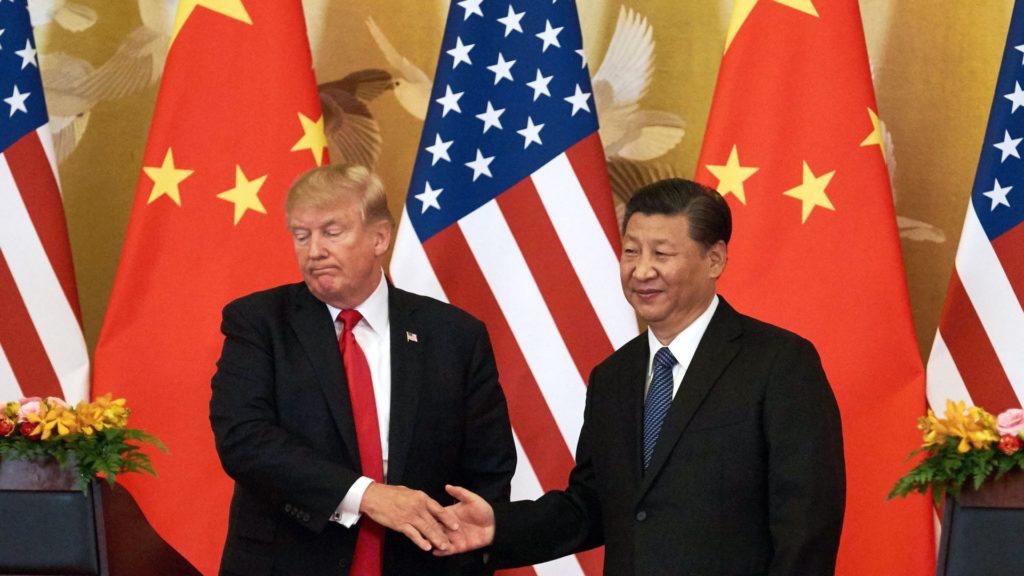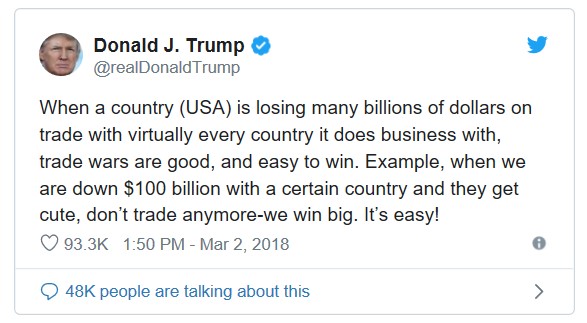
What do trade wars mean in terms of welfare and economic efficiency? How do we move from “collaborative negotiation” to “distributive negotiation”?
The USA have been championing market economics and imposing globalism for many decades now. However we see a turning point in US economic policy in the last few years. The USA leaves foreign trade agreements, imposes trade barriers and import duties, and even goes to great lengths of sanctioning strategic and innovative companies with foreign origin, such as Huawei. President Trump argues these actions will benefit U.S. citizens, because they will mean more jobs in the USA and less trade deficit.

Let’s sit back and think for a while what trade really means. Countries trade with each other when, on their own, they do not have the resources, or capacity to satisfy their own needs and wants. By developing and exploiting their domestic scarce resources, countries can produce a surplus, and trade this for the resources they need. [1]
Trade brings in additional value by definition. The reason behind this is subjective value of the tradables. Let’s demonstrate this through an example.
Jack and John are two friends. Here are their inventories: Jack has two phones, costing $1000 each, and he has $1000 in cash. John has two computers, costing $1500 each, and he has $1000 in cash.
The second phone does not mean anything to Jack and neither does second the computer bring any benefit to John. They need only one of these devices and the second one would become obsolete through time. Let’s imagine we can measure Jack’s utility, or satisfaction, at 2000 points. (phone costing $1000 plus $1000 in cash). Then John’s utility, or satisfaction, would be 2500 points (computer costing $1500 and $1000 in cash. So two friends have a satisfaction score of 4500 points in total.
Then Jack and John decides to trade and they start negotiating. John asks for $1500 for a computer. Jack says it is not new and offers $1000. John takes this offer. Jack asks for $1000 for a phone, but they finally settle for $500. Do we have a lose-lose deal here?
Let’s calculate new satisfaction levels. Jack has one computer, one phone, and $500 in cash in his inventory, which would provide 3000 points. John has one computer, one phone and $1500 in cash, which totals 4000 points. So total points of their satisfaction increased from 4500 to 7000. In other words, negotiations and trade created additional value of 2500 points.
Collaborative negotiation (also called “win-win”, “integrative”, “constructive”, “interest-based”) is a negotiation strategy in which parties collaborate to find a “win-win” solution to their dispute. This strategy focuses on developing mutually beneficial agreements based on the interests of the disputants. Integrative bargaining is important because it usually produces more satisfactory outcomes for the parties involved than does distributive negotiations (also called “positional bargaining”). Distributive negotiation is based on fixed, opposing viewpoints (positions) and tends to result in compromise or no agreement at all. [2]
Distributive negotiation is important because there are some disputes that cannot be solved in any other way — they are inherently zero-sum. If the stakes are high, such conflicts can be very resistant to resolution. [3]
Economy is rarely a zero-sum game. Recession cycles are temporary and the world economy has grown drastically over the history. Therefore collaborative negotiation and trade should prevail in the long run. Protectionism might be popular nowadays, but world will focus on growing the pie sooner or later.
[1] “Why do countries trade?”, Economics Online https://www.economicsonline.co.uk/Global_economics/Why_do_countries_trade.html
[2] Spangler, Brad. “Integrative or Interest-Based Bargaining.” Beyond Intractability. Eds. Guy Burgess and Heidi Burgess. Conflict Information Consortium, University of Colorado, Boulder. Posted: June 2003
[3] Spangler, Brad. “Distributive Bargaining.” Beyond Intractability. Eds. Guy Burgess and Heidi Burgess. Conflict Information Consortium, University of Colorado, Boulder. Posted: June 2003
